
Prayer and Mortification: Liturgical Abnegation is Freedom
Prayer is not a matter of getting God to give us what we want, it is a method for making us want what God desires to give. That is, it is not a matter of […]

Prayer is not a matter of getting God to give us what we want, it is a method for making us want what God desires to give. That is, it is not a matter of […]

The Ruth Institute’s 5th Annual Summit for Survivors of the Sexual Revolution will be held Friday and Saturday, June 24-25, in Lake Charles, Louisiana. It will feature speakers who have lived through – and escaped […]

St. Francis Xavier Owo Parish. / Southern African Catholic Bishops’ Conference (SACBC)
St. Louis, Mo., Jun 9, 2022 / 18:40 pm (CNA).
A Nigerian government official said Thursday that the insurgent group Islamic State West Africa Province (ISWAP… […]

Sen. Ted Cruz (R-Texas) speaks in front of the Department of Justice in Washington, D.C., on June 9, 2022. / Screenshot taken from Twitter video by Ford Fischer
Washington, D.C. Newsroom, Jun 9, 2022 / 17:19 pm (CNA).
Sen. Ted Cruz and a pro-li… […]

The European Parliament in Strasbourg, France, on Nov. 25, 2014. / Alan Holdren/CNA.
London, England, Jun 9, 2022 / 10:52 am (CNA).
A Catholic leader on Thursday criticized the European Parliament for voting in favor of a motion denouncing the … […]

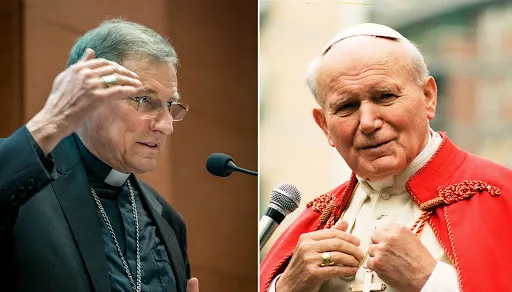 Archbishop Zbigņevs Stankevičs of Riga, Latvia (left), speaking during a Catholic conference in Warsaw in May 2022 on the natural law legacy of John Paul II (right.) / Photos by Lisa Johnston and L’Osservatore Romano
Archbishop Zbigņevs Stankevičs of Riga, Latvia (left), speaking during a Catholic conference in Warsaw in May 2022 on the natural law legacy of John Paul II (right.) / Photos by Lisa Johnston and L’Osservatore Romano
Warsaw, Poland, Jun 9, 2022 / 09:17 am (CNA).
Constant cooperation and dialogue among Catholic, Lutherans, Orthodox, and other Christian denominations have been crucial to protect life and family in the Baltic nation of Latvia, Archbishop Zbigņevs Stankevičs of Riga, Latvia, said during a recent Catholic conference in Warsaw.
Stankevičs spoke May 19 at the conference “St. John Paul II Natural Law Legacy,” organized by the Ave Maria School of Law and the Cardinal Stefan Wyszynski University in Warsaw.
In his speech, Stankevičs shared his personal ecumenical experience in Latvia as an example of how the concept of natural law proposed by St. John Paul II can serve as the basis for ecumenical cooperation in defending human values.
The metropolitan archbishop, based in Latvia’s capital, is no stranger to ecumenical work and thought. In 2001, he became the first bishop consecrated in a Lutheran church since the split from Protestantism in the 1500s. The unusual move, which occurred in the church of Evangelical Lutheran Cathedral in Riga, formerly the Catholic Cathedral of St. Mary, signaled the beginning of Stankevičs’ cooperation with the Lutheran church in Latvia, a cooperation that would ultimately become a partnership in the cause of life and the family. Since 2012, the archbishop has served on the Pontifical Council for Promoting Christian Unity.
“I would like to present this ecumenical cooperation in three experiences in my country: the abortion debate, the civil unions discussion, and the so-called Istanbul convention,” Stankevičs began.
Entering the abortion debate
Ordained as a priest in 1996, Stankevičs struggled to find proper consultation for Catholic couples on natural family planning. It was then that he decided to create a small center that provided natural family planning under the motto “let us protect the miracle [of fertility].”
This involvement in the world of natural family planning would lead him into the heart of the abortion debate in Latvian society, and, ultimately, to the conclusion that moral discussions in the public square benefit from a basis in natural law, something emphasized in the teachings of John Paul II.
“I knew that theological arguments would not work for a secular audience, so I wanted to show that Catholic arguments are not opposed to legal, scientific, and universal arguments, but rather are in harmony with them,” Stankevičs said.
“[A] few years later our parliament introduced the discussion to legalize abortion. No one was doing anything so I decided to do something. I consulted some experts and presented a proposal that was published in the most important secular newspaper in Latvia,” the archbishop said.
Stankevičs’ article, “Why I was Lucky,” used both biological and theological arguments to defend human life. He noted that his own mother, when pregnant with him, was under pressure to get an abortion; “but she was a believer, a Catholic, so she refused the pressure.”
After the Latvian parliament legalized abortion in 2002, the different Christian confessions decided to start working together to protect the right to life and the family.
In Latvia, Catholics comprise 25% of the population, Lutherans 34.2%, and Russian Orthodox 17%, with other smaller, mostly Christian denominations making up the remainder.
“We started to work together by the initiative of a businessman in Riga, a non-believer who wanted to promote awareness about the humanity of the unborn,” the archbishop recalled.
“Bringing all Christians together in a truly ecumenical effort ended up bearing good fruits because we worked together in promoting a culture of life: From more than 7,000 abortions per year in 2002, we were able to bring it down to 2,000 by 2020,” he said.
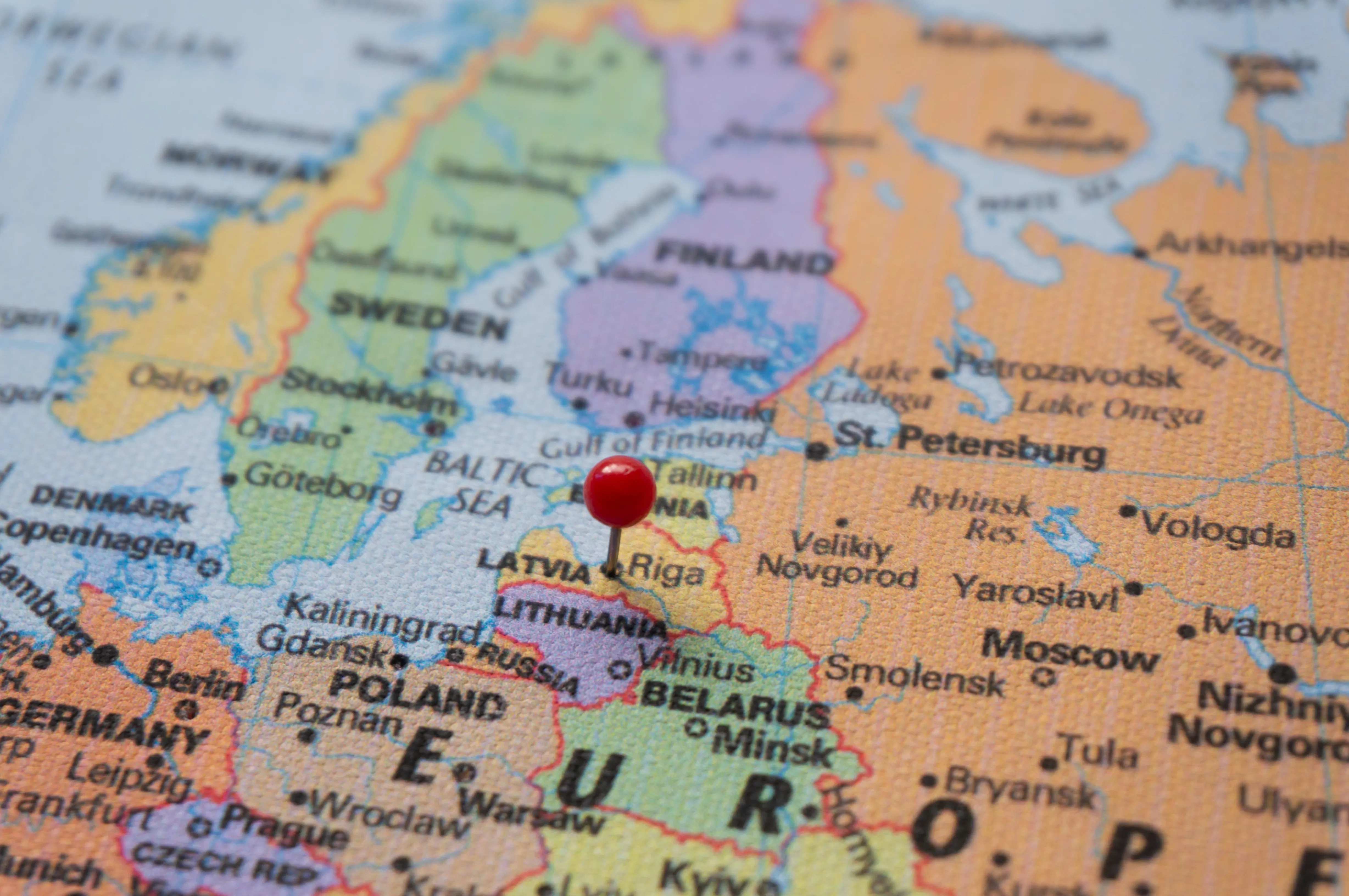
Ecumenical defense of marriage, family
Regarding the legislation on civil unions, another area where Stankevičs has rallied ecumenical groups around natural law defense of marriage, the archbishop said that he has seen the tension surrounding LGBT issues mount in Latvian society as increased pressure is brought to bear to legalize same-sex unions.
Invited to a debate on a popular Latvian television show called “One vs. One” after Pope Francis’ remark “who am I to judge?” was widely interpreted in Latvian society as approving homosexual unions, Stankevičs “had the opportunity to explain the teachings of the Catholic Church and what was the real meaning of the Holy Father’s words.”
After that episode, in dialogue with other Christian leaders, Stankevičs proposed a law aimed at reducing political tensions in the country without jeopardizing the traditional concept of the family.
The legislation proposed by the ecumenical group of Christians would have created binding regulations aimed at protecting any kind of common household; “for example, two old persons living together to help one another, or one old and one young person who decide to live together.”
“The law would benefit any household, including homosexual couples, but would not affect the concept of [the] natural family,” Stankevičs explained. “Unfortunately the media manipulated my proposal, and the Agency France Presse presented me internationally as if I was in favor of gay marriage.”
In 2020, the Constitutional Court in Latvia decided a case in favor of legalizing homosexual couples and ordered the parliament to pass legislation according to this decision.
In response, the Latvian Men’s Association started a campaign to introduce an amendment to the Latvian constitution, to clarify the concept of family. The Latvian constitution in 2005 proclaimed that marriage is only between a man and a woman, but left a legal void regarding the definition of family, which the court wanted to interpret to include homosexual unions.
The Latvian bishops’ conference supported the amendment presented by the Men’s Association, “but most importantly,” Stankevičs explained, “we put together an ecumenical statement signed by the leaders of 10 different Christian denominations supporting the idea that the family should be based on the marriage between a man and a woman. The president of the Latvian Jewish community, a good friend, also joined the statement.”
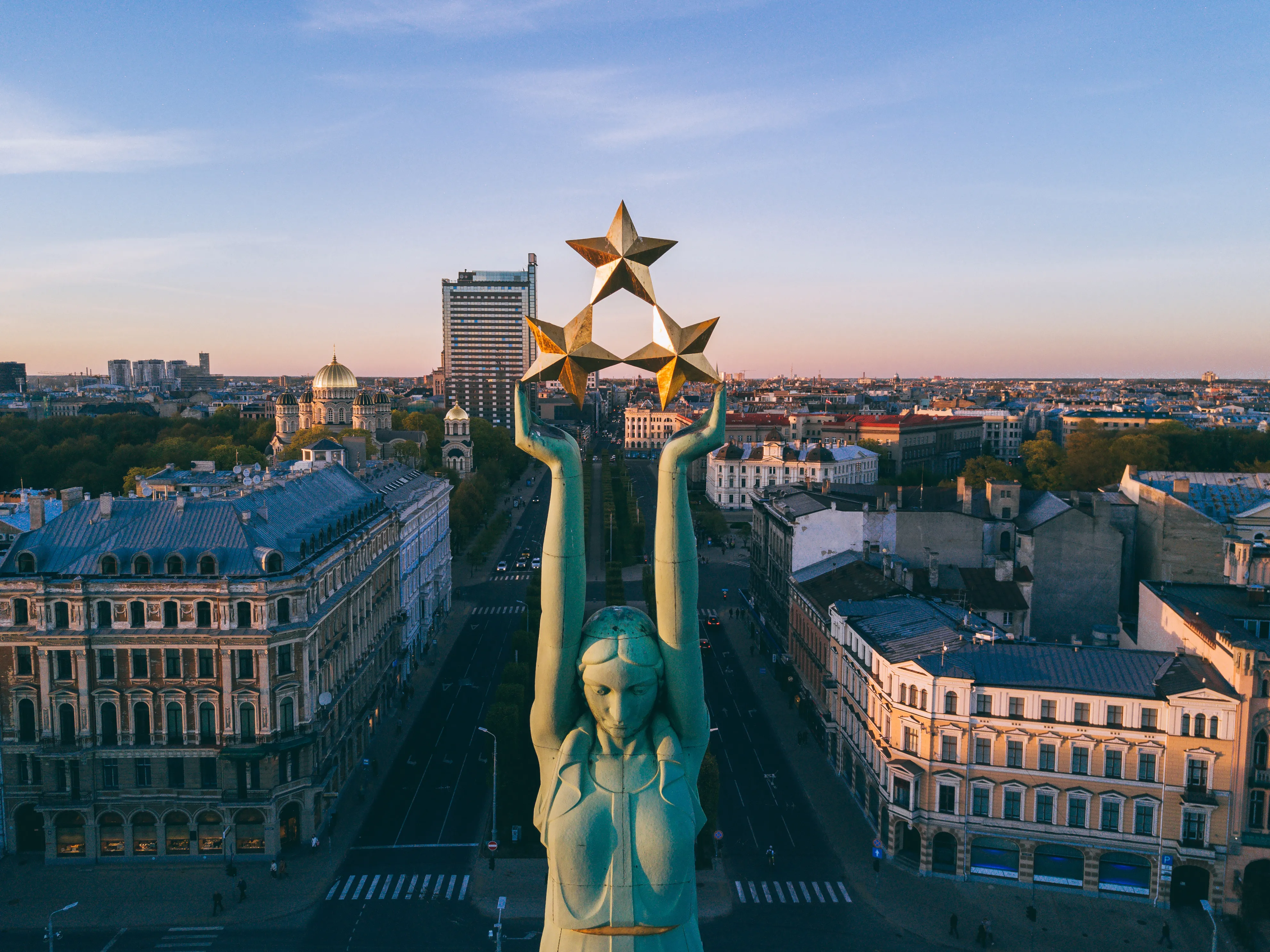
According to Stankevičs, something strange happened next. “The Minister of Justice created a committee to discuss the demand of the constitutional court, and it included several Christian representatives, including three from the Catholic Church, which worked for a year.” But ignoring all the discussions and proposals, the Minister of Justice ended up sending a proposal to parliament that was a full recognition of homosexual couples as marriage.
The response was also ecumenical: Christian leaders sent a letter encouraging the parliament to ignore the government’s proposal.
According to Stankevičs, the proposal has already passed one round of votes “and it is very likely that it will be approved in a second round of votes, with the support of the New Conservative party. But we Christians continue to work together.”
Preventing gender ideology
The third field of ecumenical cooperation mentioned by Stankevičs concerned the Istanbul Convention, a European treaty which the Latvian government signed but ultimately did not ratify.
The treaty was introduced as an international legal instrument that recognizes violence against women as a violation of human rights and a form of discrimination against women.
The convention claims to cover various forms of gender-based violence against women, but Christian communities in Latvia have criticized the heavy use of gender ideology in both the framing and the language of the document.
The word “gender,” for instance, is defined as “the socially constructed roles, behaviors, activities, and attributes that a given society considers appropriate for women and men,” a definition that allows gender to be defined independent of biological sex and therefore opens the document to the question of whether it really is aimed at the protection of women.
Christian communities also question the biased nature of the committee designated to enforce the convention.
The governments of Slovakia and Bulgaria refused to ratify the convention, while Poland, Lithuania, and Croatia expressed reservations about the convention though it was ultimately ratified in those countries, a move the government of Poland is attempting to reverse.
“When we found out that the Latvian parliament was going to ratify it, I went to the parliament and presented the common Christian position,” Stankevičs explained. As a consequence of that visit, the Latvian parliament decided not to ratify the convention, Stankevičs said, crediting the appeal to the unity provided by the common Christian position argued via natural law.
“In conclusion,” the archbishop said, “I can say that in Latvia we continue to defend the true nature of life and family. But if we Catholics would act alone, we would not have the impact that we have as one Christian majority. That unity is the reason why the government takes us seriously.”

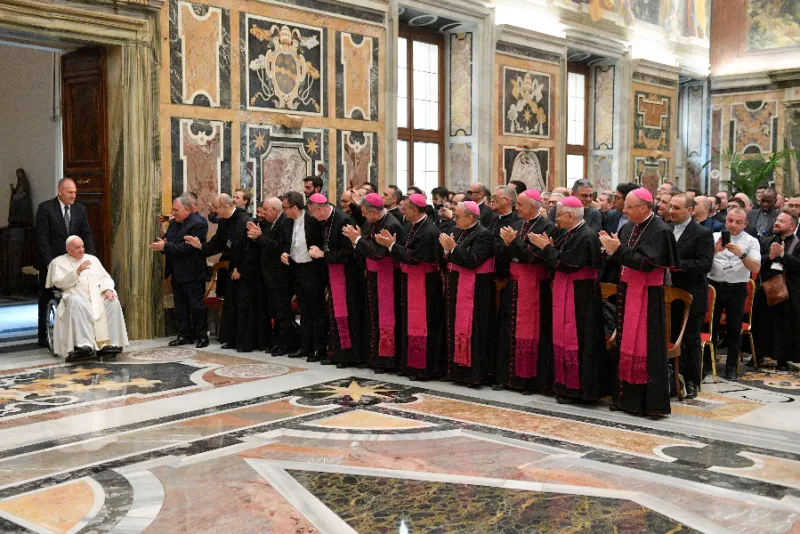 Pope Francis meets the bishops and priests of the churches of Sicily, Italy, in the Vatican’s Clementine Hall on June 9, 2022. / Vatican Media.
Pope Francis meets the bishops and priests of the churches of Sicily, Italy, in the Vatican’s Clementine Hall on June 9, 2022. / Vatican Media.
Vatican City, Jun 9, 2022 / 09:00 am (CNA).
Pope Francis told priests and bishops from the Italian island of Sicily on Thursday to be strong moral guides, and to update their art and vestments in conformity with Church reforms.
“In Sicily, people still look to priests as spiritual and moral guides, people who can also help to improve the civil and social life of the island, to support the family, and to be a reference for growing young people. High and demanding is the Sicilian people’s expectation of priests,” the pope said during a June 9 meeting at the Vatican.
In improvised comments during his speech, Francis also addressed a topic that he said “worries” him: the progress of the reforms of the Second Vatican Council, particularly relating to the liturgy.
“I don’t know, because I don’t go to Mass in Sicily and I don’t know how the Sicilian priests preach, whether they preach as was suggested in [the 2013 apostolic exhortation] Evangelii gaudium or whether they preach in such a way that people go out for a cigarette and then come back,” the pope said.
He suggested that after eight minutes of a homily, most people’s attention begins to wane.
Noting that he had seen photos from Masses in Sicily, Francis appeared also to comment on the use of lace on the vestments priests wear while celebrating Mass.
“Where are we 60 years after the Council,” he said. “Some updating even in liturgical art, in liturgical ‘fashion.’”
“Yes, sometimes bringing some of grandma’s lace is appropriate, sometimes. It’s to pay homage to grandma, right?” he continued. “It’s good to honor grandma, but it’s better to celebrate the mother, Holy Mother Church, and how Mother Church wants to be celebrated. So that insularity does not prevent the true liturgical reform that the Council sent out.”
Sicily, a southern Italian island region, has a population of 5 million people. The Catholic Church in the region is divided into 18 dioceses.
Around 300 of the island’s 2,078 priests, and 20 bishops, are in Rome for a pilgrimage and meeting with Pope Francis to mark the 30th anniversary of the Church in Sicily’s Regional Marian Priests’ Day.
Sicily, like the rest of Italy, is facing a decline in vocations to the priesthood, with 30% fewer seminarians compared with a decade ago.
In his speech in the Apostolic Palace, Pope Francis reflected on the changing times, including the decline in vocations.
The 85-year-old pope, who has made public appearances in a wheelchair since May 5 due to knee pain, said that priests and bishops needed to make courageous choices, with the discernment of the Holy Spirit, about how to share the Gospel of Christ today.
“We witness in Sicily behaviors and gestures marked by great virtues as well as cruel heinousness,” he said. “As well, alongside masterpieces of extraordinary artistic beauty we see scenes of mortifying neglect.”
He noted the declining social situation, including the fall in population due to a low birthrate and the exodus of young people looking for work.
“We need to understand how and in what direction Sicily is experiencing the change of age and what paths it could take, in order to proclaim, in the fractures and joints of this change, the Gospel of Christ,” he said.
“This task, while entrusted to the entire people of God, asks of us priests and bishops full, total, and exclusive service,” Pope Francis commented.
“Please, do not stand in the middle of the road,” he urged. “Faced with the awareness of our weaknesses, we know that the will of Christ places us in the heart of this challenge.”
“The key to everything is in his call,” he underlined, “on which we lean to take to the sea and cast our nets again. We do not even know ourselves, but if we return to the call, we cannot ignore that Face who has met us and drawn us behind Himself, even united us to himself, as our tradition teaches when it states that in the liturgy we even act ‘in persona Christi.’”
“This full unity, this identification, we cannot limit it to the celebration, but rather we must live it fully in every moment of life, mindful of the Apostle Paul’s words: ‘No longer do I live, but Christ lives in me,’” he said.

 Queen of the Holy Rosary Catholic Church in Hostyn, Texas, is shown on fire on June 9, 2022. / Fayette County Sheriff’s Office
Queen of the Holy Rosary Catholic Church in Hostyn, Texas, is shown on fire on June 9, 2022. / Fayette County Sheriff’s Office
Washington, D.C. Newsroom, Jun 9, 2022 / 08:30 am (CNA).
Queen of the Holy Rosary Catholic Church in Hostyn, Texas, was shown burning with fire Thursday morning in a video on Facebook.
The video, which was posted by The Fayette County Record early June 9, says, “Holy Rosary Church in Hostyn is on fire this morning. Numerous emergency crews now on scene. No further details at this time.”
That video was reposted by the Diocese of Victoria. The diocese said in its post to “Please keep Father Felix Twumasi and the parishioners of Holy Rosary Church in Hostyn in your prayers. We will post updates as information is available.”
Father Felix K. Twumasi is listed as the parochial administrator on the parish’s website.
Holy Rosary Church in Hostyn is on fire this morning. Numerous emergency crews now on scene. No further details at this time.
Posted by The Fayette County Record on Thursday, June 9, 2022
The Fayette County Sheriff’s Office posted on its Facebook page multiple other photos of the fire Thursday morning.
“Fayette County Sheriff Keith Korenek is reporting that FM 2436 at Hostyn is currently shut down due to a large fire at the Queen of the Holy Rosary Catholic Church in Hostyn,” the post says.
“The roadway is completely closed at this time,” the post says. “Please avoid the area so that first responders may do their jobs!”
This is a developing story.

Charles de Foucauld / Public domain
Rome Newsroom, Jun 9, 2022 / 07:38 am (CNA).
Pope Francis on Wednesday encouraged future Vatican diplomats to model themselves on the recently canonized St. Charles de Foucauld.The pope urged students of the … […]

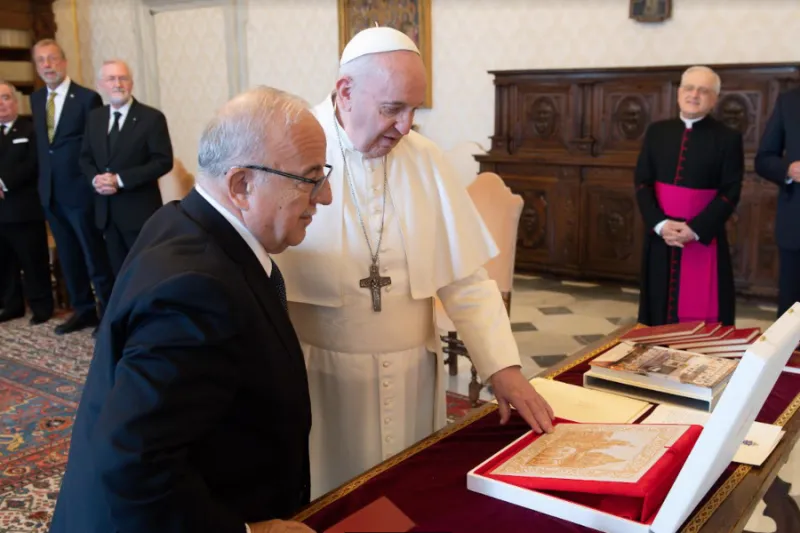 Pope Francis meets with the Order of Malta’s Fra’ Marco Luzzago on June 25, 2021. / Vatican Media
Pope Francis meets with the Order of Malta’s Fra’ Marco Luzzago on June 25, 2021. / Vatican Media
Vatican City, Jun 9, 2022 / 04:26 am (CNA).
In a condolence message on Wednesday, Pope Francis praised the “luminous Christian witness” of Order of Malta leader Fra’ Marco Luzzago.
Luzzago, who had overseen the 1,000-year-old institution since 2020, died on June 7 after a sudden illness.
The pope offered his condolences in a telegram to Cardinal Silvano Maria Tomasi, the pope’s special delegate to the Order of Malta.
The telegram said: “Spiritually sharing in the grief at the sudden passing of His Excellency Fra’ Marco Luzzago, Lieutenant of the Grand Master, I wish to offer my condolences to his family and to the entire order and, in remembering his commitment generously lavished in the performance of his high office in the service of this institution, as well as his love for the Church and luminous Christian witness, I invoke eternal peace for him and from my heart impart my blessing to you … to the interim Lieutenant Fra’ Ruy Gonçalo do Valle Peixoto de Villas-Boas, to the Grand Magistry, and to all the members of the Sovereign Military Order of Malta.”
Luzzago died at the age of 71 at Villa Ciccolini in the Italian province of Macerata.
The Italian medical doctor, who was related to Pope Paul VI, was elected as Lieutenant of the Grand Master on Nov. 8, 2020.
He was expected to serve for a one-year term ahead of the election of a new Grand Master of the order, a position traditionally held for life.
But his term was extended by Pope Francis amid a push to conclude a years-long process of constitutional reform.
Fra’ Ruy Gonçalo do Valle Peixoto de Villas-Boas, the order’s Grand Commander since 2019, will oversee the organization until the election of a new leader.
© Catholic World Report